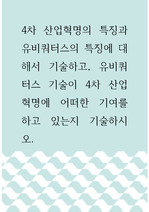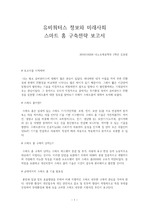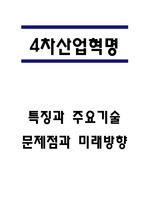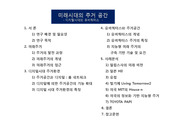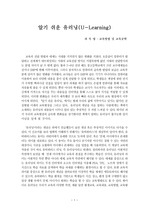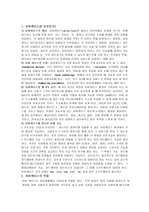

-
미리보기
소개
유비쿼터스 관련 ppt 파일이구요,
영문으로 작성되었습니다. ^^목차
Ⅰ Introduction
Ⅱ Privacy Consciousness
Ⅲ Privacy Right
Ⅳ Privacy Guidelines
Ⅴ Ubiquitous Computing Systems to Protect Privacy
Ⅵ In Conclusion본문내용
Ⅰ Introduction
Ubiquitous Information Society in 2010
Aim of Policy and Ethics
1To prescribe privacy guidelines from
view point of social sciences to clarify
fundamental requirements that ubiquitous
computing system should meet
2To examine legislation or ethical frameworks that will be necessary in future
ubiquitous information society
Ⅱ Privacy Consciousness
1 Social Investigations
In 2003: “Research on the Consciousness of Users in the Information Society”
In 2004: Group Interview for Users
2 Outcome of Social Investigations
Many Korean have anxiety for the appearance of the leaking of personal information, surveillance socialization, and new crimes.
Ⅲ Privacy Right
What is privacy right?
Now “self-information control theory” becomes
most influential opinion in the world and Korea.
ⅣPrivacy Guidelines
”OECD Guidelines on the Protection of Privacy and Transborder Flows of Personal Data” (1980)참고자료
· 없음태그
-
자료후기
-
자주묻는질문의 답변을 확인해 주세요

꼭 알아주세요
-
자료의 정보 및 내용의 진실성에 대하여 해피캠퍼스는 보증하지 않으며, 해당 정보 및 게시물 저작권과 기타 법적 책임은 자료 등록자에게 있습니다.
자료 및 게시물 내용의 불법적 이용, 무단 전재∙배포는 금지되어 있습니다.
저작권침해, 명예훼손 등 분쟁 요소 발견 시 고객센터의 저작권침해 신고센터를 이용해 주시기 바랍니다. -
해피캠퍼스는 구매자와 판매자 모두가 만족하는 서비스가 되도록 노력하고 있으며, 아래의 4가지 자료환불 조건을 꼭 확인해주시기 바랍니다.
파일오류 중복자료 저작권 없음 설명과 실제 내용 불일치 파일의 다운로드가 제대로 되지 않거나 파일형식에 맞는 프로그램으로 정상 작동하지 않는 경우 다른 자료와 70% 이상 내용이 일치하는 경우 (중복임을 확인할 수 있는 근거 필요함) 인터넷의 다른 사이트, 연구기관, 학교, 서적 등의 자료를 도용한 경우 자료의 설명과 실제 자료의 내용이 일치하지 않는 경우
함께 구매한 자료도 확인해 보세요!
-
[공학]유비쿼터스의 이론, 적용사례, 장단점, 결론 10페이지
* Ubiquitous * The origin of Ubi * Ubiquitous definition -> Everywhere, ever-present, pervasive, omnipresent, universal * Ubiquitous Computing -> Advanced computing system * Ubiquitous Technolog.. -
[경영]e-business와 b2b 20페이지
Company should create their plans and select software that not only meets today’s business needs, but also future business requirements, evolving business models and an ever-changing technological lan.. -
USN 구축을 위한 센서의 현황 21페이지
- USN을 위한 5대 요소 기술 1) 인터페이스 2) 보안 3) 커뮤니케이션 4) 프로세싱 5) 센서 - 버클리 : Smart Dust Crossbow : Mica 시리즈 팬텍&큐리텔 : Zigbee탑재 휴대폰 개발 옥타콤, 휴인스 : Zigbee 기반 노드 개발 - 관련기술 유.. -
유비쿼터스 건강안심 시스템 31페이지
(1) 건강 수명의 연장에 따른 의료 관련 재정부담 경감. 문제 : 해마다 계속되는 부상 및 질병치료비 국민의료비의 증대 , 건강보험조합의 해산 증가 , 국민의 직접적인 의료비 부담 문제해결 : 건강관리 및 질병예방에 대한 충분한 인식 , 재활의 보급.. -
유비쿼터스의 정의와 역기능 등 8페이지
□ 유비쿼터스의 정의 유비퀴터스(Ubiquitous)란 라틴어로 ‘언제, 어디서나(Anytime, Anywhere) 동시에 도달하는 곳에 존재한다’라는 뜻을 가지고 있다. 그 의미는 언제 어디서나 어떤 것을 이용해서라도 온라인 네트워크 상에 있으면서 서비스를 받는 환경/공간을 의미한다. 유비쿼터스의 대명제는 모든 사물에 칩이 깃든다는 것이다. 우리..
찾으시던 자료가 아닌가요?
지금 보는 자료와 연관되어 있어요!
문서 초안을 생성해주는 EasyAI
![[공학]유비쿼터스](https://image4.happycampus.com/Production/thumb212/2006/11/07/data4216027-0001.jpg)


